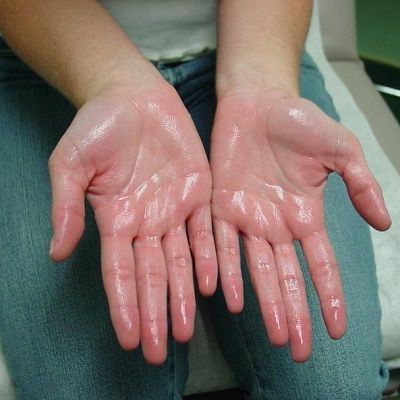Finest Dermatology Approaches for Sweaty Hands Treatment: Tips and Techniques
Finest Dermatology Approaches for Sweaty Hands Treatment: Tips and Techniques
Blog Article
Recognizing the Origin of Excessive Sweating and Its Influence On Daily Life
While it is frequently comprehended as a physiological reaction to regulate body temperature level, the triggers for too much sweating can vary widely among people, incorporating not just physical elements but mental and likewise psychological aspects. By delving into the origin creates of hyperhidrosis and exploring its multifaceted effects, a much deeper understanding of this prevalent problem can be acquired, shedding light on the intricacies that individuals grappling with excessive sweating browse on an everyday basis.
Physiology of Sweat Glands
The law of sweat production, an essential physical process, is primarily regulated by the activity of gland distributed throughout the human body. Gland are classified right into two major types: eccrine and apocrine glands. Eccrine glands are one of the most many and are found in mostly all areas of the body. They play an essential function in thermoregulation by producing a watery fluid onto the skin's surface area, which assists and vaporizes cool the body down. In comparison, apocrine glands are concentrated in locations rich in hair follicles, such as the underarms and groin, and their secretions are thicker and milky in look.
When the body temperature level rises, either because of physical task, high temperatures, or emotional stress and anxiety, the nerves activates the gland to generate sweat. This sweat is composed mainly of water and electrolytes like salt and chloride. The procedure of sweat manufacturing is vital for keeping the body's internal temperature within a narrow, ideal array, highlighting the critical function sweat glands play in human physiology.
Triggers for Excessive Sweating
In recognizing the origin of extreme sweating, it is vital to recognize the triggers that can lead to this physiological action. Too much sweating, additionally referred to as hyperhidrosis, can be prompted by various aspects, both physical and ecological. One usual trigger is psychological stress or anxiety, which can promote the body's gland to create even more sweat than is needed for cooling down. Physical physical effort, heats, and spicy foods are also understood to set off extreme sweating in people susceptible to this condition. Additionally, particular clinical conditions like diabetic issues, menopause, or hyperthyroidism can contribute to excessive sweating as well.
Furthermore, drugs such as some antidepressants, opioids, and specific supplements can likewise serve as triggers for hyperhidrosis. Recognizing these triggers is necessary in managing too much sweating efficiently - How to stop sweaty hands. By recognizing and attending to the specific triggers that trigger too much sweating in a private, medical care suppliers can develop individualized therapy plans to ease this condition and enhance the person's lifestyle
Medical Conditions Associated
Linked with excessive sweating are different clinical conditions that can worsen this physical response. One typical problem is hyperhidrosis, a problem characterized by unusually raised sweating that exceeds the body's thermoregulatory requirements. This can materialize in focal locations like the hands, soles, underarms, or face, impacting an individual's lifestyle as a result of social embarrassment and discomfort.
Furthermore, endocrine disorders investigate this site such as hyperthyroidism, diabetes mellitus, and menopausal warm flashes can likewise cause too much sweating. Hyperthyroidism triggers an overflow of thyroid hormones, accelerating metabolism and triggering sweating. Diabetes mellitus can cause sweating episodes, especially during hypoglycemic episodes when blood glucose degrees go down also reduced. Menopausal hot flashes, credited to hormone variations during menopause, can cause sudden and intense sweating, commonly accompanied by flushing and heart palpitations.
Additionally, infections like hiv, endocarditis, and tuberculosis have been linked with night sweats, a common signs and symptom understood to disrupt rest and affect total wellness. These medical problems highlight the diverse variety of underlying elements that can add to extreme sweating, necessitating detailed examination and management by health care professionals.
Emotional and emotional Aspects

Influence On Social Communications
Too much sweating can have profound results on an individual's capability to involve comfortably in social interactions. The noticeable signs of sweat spots or damp patches on clothes can bring about embarrassment and self-consciousness, triggering people to withdraw from social circumstances. This withdrawal can affect partnerships, limit social tasks, and prevent individual and professional development.

Furthermore, the stress and anxiety and self-worth concerns originating from excessive sweating can affect communication and interpersonal skills. Individuals may struggle to focus on conversations, participate in group activities, or express themselves confidently. This can lead to feelings of seclusion and isolation, as social links come to be testing to keep.
Verdict

While it is generally content comprehended as a physiological response to manage body temperature level, the triggers for extreme sweating can vary extensively amongst individuals, encompassing not just physical elements but additionally psychological and psychological elements. By diving into the origin triggers of hyperhidrosis and exploring its complex impacts, a deeper understanding of this prevalent issue can be obtained, dropping light on the complexities that people grappling with excessive sweating browse on an everyday basis.
Physical exertion, high temperature levels, and spicy foods are also recognized to set off too much sweating in individuals vulnerable to this condition. By recognizing and attending to the specific triggers that motivate excessive sweating in a specific, healthcare service providers can develop customized therapy plans to reduce this condition and boost the individual's top quality of life.
Excessive sweating can have extensive effects on an individual's capacity to engage easily in social interactions.
Report this page